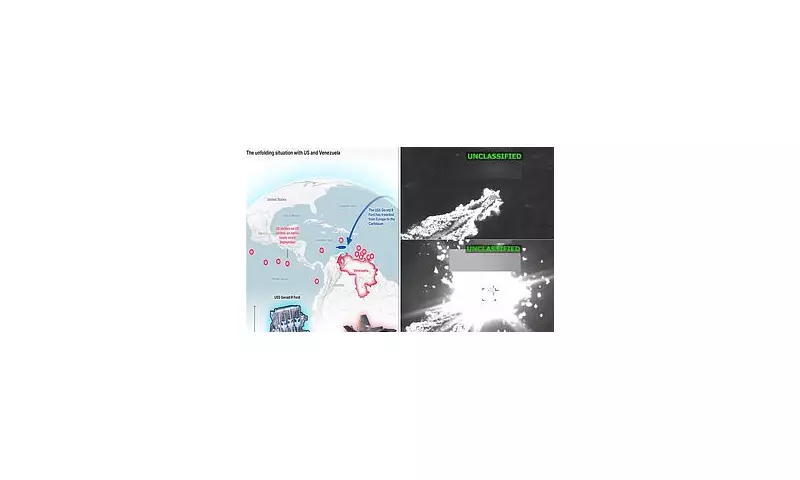
The United States has escalated its military presence in the Caribbean Sea with the deployment of the world's most advanced aircraft carrier, the USS Gerald R Ford, as tensions with Venezuela reach boiling point. This development signals what could become one of the most explosive standoffs in recent American history.
Military Buildup Reaches Critical Mass
The arrival of the USS Gerald R Ford represents the culmination of a significant military buildup around Venezuela. The nuclear-powered carrier sailed from Europe equipped with approximately four fighter squadrons of multirole F/A-18 Super Hornets and a unit of EA-18 Growler electronic attack aircraft specialised in jamming enemy radar systems.
This deployment complements an already substantial US military presence in the region, including 10 Marine Corps F-35 stealth fighters stationed in Puerto Rico, along with AV-8 Harrier jump jets and AH-1 attack helicopters aboard the amphibious assault ship USS Iwo Jima. The total force now includes thousands of military personnel spread across roughly a dozen major warships and bases throughout the southern Caribbean.
Former US ambassador to Venezuela James Story has dramatically revised his assessment of potential military action, stating the likelihood has surged from 10% in recent months to 80% following these developments.
Trump's 'Narco-Terrorist' Campaign
President Donald Trump has framed the escalating situation as part of his administration's campaign against what he terms 'narco-terrorists'. He claims the objective is to prevent cocaine and other drugs from reaching American streets.
When questioned by reporters last week about potential military action against Venezuela, Trump offered a cryptic response: 'I can't tell you what it would be, but I've sort of made up my mind.' His comments have been widely interpreted across the region as hinting at possible air or missile strikes on Venezuelan territory.
The Pentagon has formally incorporated recent strikes into a broader mission called Operation Southern Spear. Since September, US forces have conducted at least 21 strikes on 22 vessels in the Caribbean and eastern Pacific, resulting in 83 confirmed fatalities with only two survivors.
International Criticism and Regional Fallout
The American military actions have drawn significant international criticism. United Nations High Commissioner for Human Rights Volker Türk has labelled the attacks on alleged drug boats 'unacceptable' and urged Washington to halt them immediately, warning they risk amounting to 'extrajudicial killings' in violation of international human rights law.
Regional allies have expressed strong objections. Colombia's President Gustavo Petro has called the strikes 'murder' and suspended some intelligence sharing with Washington. Mexico's president has complained about operations near its waters and insisted Mexican forces should intercept suspicious boats rather than US aircraft.
Even the United Kingdom, traditionally a close US ally, has reportedly restricted intelligence-sharing regarding suspected smuggler boats in the region.
Venezuela's Defensive Capabilities and Russian Alliance
Venezuela President Nicolas Maduro has accused Washington of using the war on drugs as a pretext to topple his government and seize Venezuela's substantial oil and mineral wealth. He has mobilised domestic support by portraying the US as an imperial power seeking Venezuela's resources.
Despite Venezuela's conventional armed forces being estimated at around 125,000 personnel with issues of morale and desertion, the country possesses significant defensive capabilities that could make any US attack costly. Its air defence network includes Russian S-300VM surface-to-air missile systems, Buk-M2E batteries, and recently delivered Pantsir-S1 air defence vehicles.
The situation is further complicated by Venezuela's deepening alliance with Russia. In May 2025, presidents Vladimir Putin and Maduro signed a strategic partnership treaty pledging deeper cooperation in security and military fields. Kremlin officials have confirmed they are in close contact with Caracas and want to prevent escalation, while hinting they stand ready to provide additional military support.
Potential for Miscalculation
Analysts express concern that the greatest risk lies in miscalculation. A single misidentified vessel, a clash between Venezuelan jets and US warships, or an accident involving F-35s near Venezuelan airspace could rapidly escalate the cold confrontation into active conflict.
While Trump publicly insists he wants neither regime change nor war, his administration has placed a $50 million reward on Maduro's head, accused him of running a 'narco-state', and designated elements of Venezuela's security elite as terrorists.
Meanwhile, Maduro has promised to turn Venezuela into a 'republic in arms' if attacked, telling citizens the nation faces 'the biggest threat in the last 100 years'. As the USS Gerald R Ford patrols the Caribbean with its aircraft ready, both leaders maintain they don't want war while taking actions that make confrontation increasingly likely.





